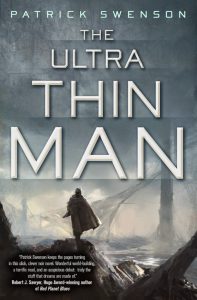
The Ultra Thin Man by Patrick Swenson
Genre: Science Fiction
Publisher: Tor on August 1, 2014
Source: Publisher
My thanks to Tor and NetGalley for providing me with a digital review copy. No compensation was provided for this review, and all opinions are my own.
In the twenty-second century, a future in which mortaline wire controls the weather on the settled planets and entire refugee camps drowse in drug-induced slumber, no one—alive or dead, human or alien—is quite what they seem. View Spoiler »
Warning: you are now entering a rant-filled zone.
The Ultra Thin Man introduces us to the interplanetary Union, a political body comprised of a handful of planets – including Earth – and uniting several species. Humans live among Memors and Helks, alien species that made contact with Earth’s scientists. The Network Intelligence Organization is tasked with monitoring political dissent and combatting terrorism; unfortunately they’ve been kept quite busy this year, as the terrorist Terl Plenko attempts to dismantle the Union by sowing seeds of discontent. The NIO is so busy, in fact, that they hire former private detectives Alan Brindos and Dave Crowell as consultants on the case.
Although the political landscape has shifted and the threats to dominant powers have changed, some things remain the same: people still have a tough time dealing with difference and as a result there’s considerable animosity directed towards these non-humans. There is particular prejudice directed towards Helks, who cannot blend into society the way that humanoid Memors can. A Helk’s physical appearance is closer to that of a gorilla than a human being, with their muscular bodies, incredible stature, and of course their fur. Many humans call them “Hulks,” a derogatory word referring to both their size and the super hero of yore. It doesn’t help matters that the infamous Terl Plenko is a Helk.
The examination of prejudice and difference was the strongest aspect of the novel, particularly since it was basically the only way we got any world building. 99% of what’s revealed about Memors and Helks comes through a massive info dump after someone uses the term “Hulk.”
Oh, we’re told that there are hyper-speed jumps to other planets (heavily controlled, TSA style), machines that regulate weather, and cloning. How? Why? Science. Also aliens. “Our narrators aren’t scientists and don’t understand it, so why should we?” is not an excuse for laziness. World build, damn it!
As you can probably tell, I thought Swenson’s writing left a lot to be desired. The very first page of The Ultra Thin Man contains the phrase “the private detective biz.” Biz. BIZ. How did this get past an editor? Does that not set your teeth on edge? AM I CRAZY?*
As if the use of “biz” wasn’t gag-worthy enough, when Brindos visits a woman in the hospital he notes that:
“She was attractive the way a pretty librarian seems sexy with her glasses off.”
Now maybe it’s just me, but that line does not put me in a very forgiving mood. Maybe it’s the librarian dig. Or maybe it’s the fact that apparently glasses aren’t sexy (salient point: I wear glasses). But it’s probably the fact that these things combine to objectify a woman IN THE HOSPITAL.
There’s also some confusion about exactly who’s narrating and when. Alan Brindos and Dave Crowell’s voices are almost completely identical. Tough, emotionally closed-off, and cerebral bachelors, these two are the quintessential private detectives. It’s no surprise that they once ran their own business. Oops, I mean biz. There are also several instances where the narration inexplicably changes from first to third person. Now, I read an uncorrected proof so this will probably be fixed, but it definitely took away from my reading experience.
In terms of character development, there is none. Swenson very sloppily gathers some personality traits to put together two very stereotypical private investigators, including the requisite loner status and abandonment issues. Swenson uses a little aside quite early in The Ultra Thin Man to tell us that Brindos doesn’t like the feeling of instability because he was a foster kid. Seriously, he does it just like that. One sentence.
Crowell’s character is similarly developed: in one of the chapters he narrates, Crowell states that he “sort of loved [Clara] but never really told her” and now he has regrets. He sort of loved her but never really told her. Personally I think it’s a good idea to pass on declaring your sort of love for someone, but hey, what do I know?
I’m sure that some of the more obvious problems with The Ultra Thin Man will be solved after a thorough copy edit but I wouldn’t bother picking up a finished copy of this book to double check. Honestly I probably should’ve DNFed this book but my NetGalley ratio is dismal so I slogged through.
The Ultra Thin Man: don’t say I didn’t warn you.
*Not a rhetorical question.